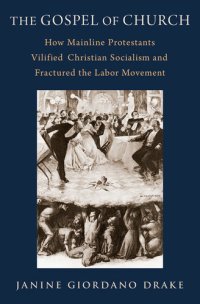
Ebook: Christianity and the Commonwealth: Socialism, the Social Gospel, and the Struggle for the Soul of the Nation
Author: Janine Giordano Drake
- Year: 2024
- Language: English
- epub
"From the end of the Civil War until the early twentieth century, Anglo, immigrant, and African American settlers were moving north and west faster than ministers within the major denominations could follow them with churches. In 1890, Northern Methodists, the largest Protestant denomination, only claimed 3.5 percent of the American population. Roman Catholics claimed 9.9 percent, and African American Baptists, the largest Black denomination, claimed only 18 percent of the African American population. In total, under 30 percent of Americans went to church on a weekly basis. While African American churches served a relatively larger role within their communities, the major white denominations played a minor role in the lives of the working poor. Clergymen like Dwight Moody reflected, "The gulf between the churches and the mases is growing deeper, wider and darker every hour." Home missionaries like Josiah Strong warned, "Few appreciate how we have become a non-churchgoing-people." Strong was right. In large fractions of the country, especially mining and industrial centers in the West, a simple lack of church edifices and long-term ministers to fundraise for them gave way to a vacuum of Protestant, denominational authority. In part, this disconnect between the number of churches and the size of the population was a result of culturally dislocated migrants. In 1890, more than 9 million Americans were foreign-born, and only a small fraction of those Americans had any familiarity with Anglo-Protestant traditions. They were joined by another 1 million African Americans migrants from the South to northern industrial centers. But this was only one of many reasons the poor did not go to church with the wealthy. While middle-class families paid lip service to the importance of building capacious churches, their own policies and practices reinforced the class system. As one minister reflected in 1887, "The working men are largely estranged from the Protestant religion. Old churches standing in the midst of crowded districts are continually abandoned because they do not reach the workingmen." Meanwhile, he continued, "Go into an ordinary church on Sunday morning and you see lawyers, physicians, merchants and business men with their families [-]you see teachers, salesmen, and clerks, and a certain proportion of educated mechanics, but the workingman and his household are not there." As the working-classes swelled with the expansion of American factories, ordained Protestant ministers served an ever-dwindling proportion of the country"--
Download the book Christianity and the Commonwealth: Socialism, the Social Gospel, and the Struggle for the Soul of the Nation for free or read online
Continue reading on any device:

Last viewed books
Related books
{related-news}
Comments (0)